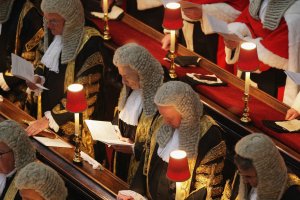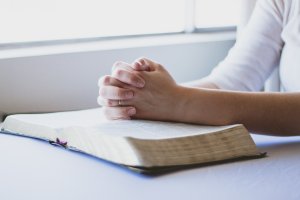We don't think religious worship should play any part in the formal business of the state.
We want to see parliamentary and local government meetings conducted in a manner equally welcoming to all attendees, whatever their personal beliefs.
Parliamentary prayers
Sittings in both the House of Commons and the House of Lords begin with Anglican prayers. MPs and peers stand for prayers facing the wall behind them – a practice thought to have developed due to the difficulty members would historically have faced of kneeling to pray while wearing a sword.
When the chamber is at its busiest, parliamentary prayers act as a bizarre and antiquated seat reservation system. Even MPs and peers who are slated to speak have no option but to attend prayers in order to reserve a seat.
Whilst they may be viewed by some as an important tradition, parliamentary prayers serve to assert the superiority of Christianity (and the Church of England in particular) at Westminster. This 'tradition' is inimical to a modern, pluralistic, secular democracy.
In the Scottish Parliament, Tuesday afternoon sessions begin with 'Time for Reflection', with faith and belief representatives invited to addresses members for up to four minutes. The Northern Ireland Assembly begins formal business with a period of two minutes of silent prayer or contemplation. The Welsh Assembly has adopted no such rituals.
Parliamentarians who wish to pray are free to do so. But prayers should not form part of the official business of Parliament.
Council prayers
Many local authorities in Britain also begin their meetings with prayer.
Local democracy should be equally welcoming to all sections of society, regardless of their religion or belief. Council meetings should be conducted without anyone feeling excluded, or compelled to either participate in prayers or absent themselves from part of the meeting.
Council prayers open the door to wholly unnecessary conflict and sectarian squabbles within local authorities. There is a history of local councillors being bullied and marginalised for challenging council prayers.
The absence of prayers from the formal business of meetings in no way impedes religious freedoms or denies anybody the right to pray. Conversely, organised worship in secular settings imposes worship on those who do not share the faith. A genuine commitment to freedom of religion or belief is incompatible with including acts of worship in the formal business of council meetings.
If local authorities wish to hold a moment of silent reflection at the beginning of a meeting, or if councillors wish to meet for prayers prior to the meeting, they are at liberty to do so.
Take action!
1. Write to your MP
Please enter your postcode and urge your MP to support an alternative to parliamentary prayers, to make parliament more welcoming to people of all faiths and none.
2. Share your story
Tell us why you support this campaign, and how you are personally affected by the issue. You can also let us know if you would like assistance with a particular issue - for example, if you would like to challenge prayers at your own council.
3. Join the National Secular Society
Become a member of the National Secular Society today! Together, we can separate religion and state for greater freedom and fairness.
Latest updates
NSS urges lord chancellor to scrap Anglican judges’ service
Posted: Tue, 1 Oct 2019 06:00
The National Secular Society has urged the lord chancellor to scrap the annual Anglican services which mark the start of the legal year, arguing that they undermine judicial neutrality.
The NSS has written to Robert Buckland to challenge the services, where judges pray for guidance while attending fully robed, in their official capacity and during working hours.
This year's main service, which is conducted according to the rites of the Church of England, takes place at Westminster Abbey today (1 October).
In the letter NSS chief executive Stephen Evans wrote that holding the services "symbolises and entrenches religious privilege and undermines the perception of impartiality of the judiciary".
He said the judiciary "must be neutral and seen to be neutral" on legal issues which religious institutions have taken an interest in, such as abortion, assisted dying and religion's role in schools.
He added that the services:
- Give "the clear impression to the public that the doctrines and practices of the Church of England are endorsed and approved by the ministers of the law".
- Raise "serious issues about the neutrality and independence, or at the very least the perceived neutrality and independence, of the judiciary".
- Are "incompatible with the generally accepted objective of achieving and demonstrating diversity in the judiciary".
- Are "incongruous" with the increasing irreligiosity and religious diversity of Britain's population.
- Cause "considerable" costs for the taxpayer.
And he added that recent revelations about the Church of England's cover up of sexual abuse also showed there should be "a clear separation between the judiciary and the church".
Explaining the NSS's decision to write the letter, Mr Evans said: "In a democratic society citizens should expect to be judged fairly and equally before the law. They should also expect issues to be handled on their merits, without the privileging of religious interests.
"This requires that the judiciary is both fully separate from religious institutions and seen to be separate from them.
"Marking the start of the legal year with an Anglican service is an inappropriate display of religious favouritism. It undermines judicial neutrality and serves to entrench deference to the Anglican faith and religion in public life more generally. These services should be scrapped or replaced with a secular alternative."
Government fails to reveal full cost of services
Earlier this year the NSS submitted a freedom of information request to the Ministry of Justice (MoJ) to ask how much the judges' services cost.
In response the MoJ told the NSS the figure was £5,827. This did not include considerable costs which the services create, such as the loss of judges' and clerks' time and the cost of extra police deployment.
Other notes
- Other judges' services also take place in other parts of the country. A service in York Minster follows a similar format to the one in Westminster. The start of the Scottish legal year was marked by a red mass at St Mary's Roman Catholic Cathedral in Edinburgh on 22 September.
- The judges' service is accompanied by a lord chancellor's breakfast, which the NSS did not object to.
Image: © Dan Kitwood / Getty Images
NSS welcomes council in Somerset’s decision to scrap prayers
Posted: Fri, 27 Sep 2019 12:18
The National Secular Society has welcomed a decision to scrap official prayers at the start of meetings at a council in Somerset.
North Somerset Council voted to remove prayers from the start of council meetings on Tuesday and rejected calls to replace them with a multi-faith 'period of reflection'.
NSS campaigns officer Megan Manson said: "This is a very welcome move from North Somerset Council.
"Councillors have acknowledged that opening meetings with Christian prayers is not only unnecessary – it's alienating for many people in the region's diverse community.
"The council has also wisely decided to avoid a 'multifaith' approach to prayers, recognising the potential conflict this could cause.
"We hope more councils adopt the same policy to make council business inclusive to all, regardless of religion or belief."
The NSS campaigns to end official prayers at all government meetings at both a local and national level.
In 2012 the High Court ruled that prayers should not be said as part of formal council business after the NSS initiated a judicial review on the subject.
But in 2015 the government changed the law in England to make prayers, "other religious observance" or "observance connected with a religious or philosophical belief" lawful at local authority meetings.
In Somerset independent councillor Caritas Charles initially proposed the change, arguing that Christian prayers should be replaced with a period of reflection led by a "variety of spiritual and voluntary groups".
He said Christian prayers gave a message "that favours one particular group".
Councillors including Labour's Catherine Gibbons argued that meetings should be secular. But others including the council's deputy leader, Mike Bell, opposed change.
Recent NSS campaigning on council prayers
- In July the NSS wrote to councillors in Norfolk urging them to vote to scrap prayers at the start of meetings. The council voted to retain the prayers.
- The NSS has also lobbied councils in Wales to ensure any prayers are genuinely separate from meetings. The 2012 High Court judgment still applies in Wales.
- The NSS recently asked an equalities charity in Kent to reconsider its support for council prayers.
Image by reenablack from Pixabay.




